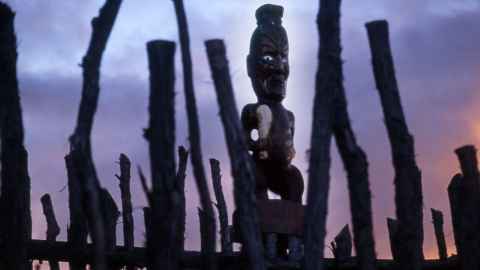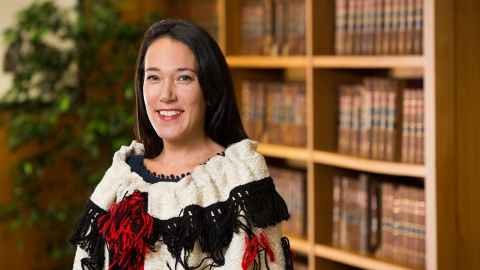Legal academic to discuss constitution’s fragile foundations
17 October 2022
The legality of the British Crown’s claims to sovereignty in Aotearoa New Zealand is being examined by legal academic Dr Claire Charters at the 2022 Bruce Jesson Memorial Lecture.

“There are conflicting legal narratives for the British Crown’s claim to sovereignty and as such, Aotearoa’s constitution is unstable,” says Dr Claire Charters, who is sharing her research, thoughts and findings at the annual Bruce Jesson Memorial Lecture this week.
Many of the long-held understandings regarding the Crown’s claim to sovereignty have been convincingly shown to be implausible when tested, says Charters, something pioneering Māori lawyer and activist Moana Jackson would call myth-takes.
Dr Charter’s lecture, titled Legal myth-takes and the Crown’s claim to sovereignty over Aotearoa New Zealand: What are the implications for New Zealand’s constitution today? examines the various legal narratives regarding the Crown’s claim to sovereignty over Aotearoa New Zealand.
Acknowledging and exposing the various conflicts and implausibility inherent in narratives regarding the Crown’s claim to sovereignty illuminates the type of constitutional design needed to legitimise and legalise Aotearoa New Zealand’s constitution, says Charters (Ngāti Whakaue, Tūwharetoa, Ngāpuhi, Tainui).
“Most importantly, adopting a Western-style, higher-law written constitution is not enough. We need a constitution that can reconcile New Zealand’s basis in the coming together of two peoples and two legal orders, and one that can justifiably claim to regulate multi-cultural and multi-ethnic contemporary New Zealand."

Charters says the people of Aotearoa New Zealand can look to examples around the world, to areas where there is ongoing and dynamic attention to decolonising legal systems and constitutions, to help inform constitutional design here.
“While there is much to learn from the US, Canada and Australia, there are also important lessons to learn from Greenland, Finland, Chile, the Pacific, and Africa.”
Following the lecture this week, Charters is bringing thought leaders and academics from around the world together to participate in a once-in-a-decade constitutional kōrero at the University of Auckland.
The November wānanga will provide an opportunity to learn about how Indigenous peoples in other countries are reflected in constitutions and what lessons they might provide for constitutional transformation in Aotearoa New Zealand.
Dr Charters, a Royal Society Te Apārangi Rutherford Discovery Fellow and co-director of the Aotearoa New Zealand Centre for Indigenous Peoples and the Law, will deliver the lecture in the University's Old Government House lecture theatre (102-G36), 24 Princes Street, at 6pm on Tuesday, 18 October. The event is free and open to the public. Find out more.
Media contact
Sophie Boladeras | Media adviser
M: 022 4600 388
E: sophie.boladeras@auckland.ac.nz